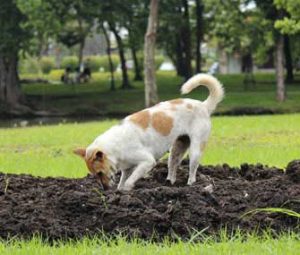Dog owners often find themselves frustrated when they discover their beloved pets digging on their beds and couches.
This behavior can be both puzzling and destructive, leaving many owners wondering why their dogs engage in this behavior.
Reasons for Dogs Digging on Furniture:
Dog Behavior Digging:
Dogs may dig on beds and couches as a way to mark their territory or establish a comfortable sleeping area.
Canine Digging Habits:
Some dogs develop a habit of digging as a form of entertainment or stress relief, especially if they’re left alone for extended periods
Dog Digging on Furniture:
Soft surfaces like beds and couches provide a cozy environment for dogs to dig and nestle into, making them appealing targets.
Preventing Dogs from Digging:
Curbing Dog Behavior:
Training and positive reinforcement techniques can help redirect your dog’s behavior away from digging on furniture.
Dog Training for Digging:
Implement consistent training sessions to teach your dog appropriate behaviors and provide alternative outlets for their energy, such as interactive toys or designated digging areas.
Managing Dog Behavior Indoors:
Ensure your dog gets enough physical and mental stimulation through regular exercise, playtime, and enrichment activities to prevent boredom-induced digging.
Discouraging Dogs from Digging on Beds and Couches
Using Deterrents:
Place double-sided tape or aluminum foil on furniture surfaces to deter your dog from digging.
Providing Comfortable Alternatives:
Offer your dog a cozy bed or blanket in their designated resting area to discourage them from digging on beds and couches.
Seeking Professional Help:
If your dog’s digging behavior persists despite your efforts, consult with a veterinarian or animal behaviorist for personalized guidance and support.
Instinctual behavior of dogs and digging
Digging is a natural instinct for dogs that can be traced back to their wild ancestors. In the wild, dogs would dig to create a den or shelter, to search for food, or to bury their prized possessions.
When dogs dig on beds and couches, they are often attempting to create a comfortable nest or den-like environment.
The softness and warmth of these furniture pieces mimic the ideal conditions for th
eir instinctual nesting behavior.
While these natural behaviors can be frustrating for owners, it is important to understand that dogs are not acting out of spite or malice. They are simply responding to their instincts.
why dogs specifically dig on beds and couches?
Now that we have established that digging is an instinctual behavior for dogs, let’s explore why they specifically target our beds and couches. One reason is that these surfaces offer a combination of comfort and familiarity.
Dogs are highly territorial animals. By digging on beds and couches, they are marking their territory and leaving their scent behind. This signifies to other animals that this space belongs to them, reinforcing their sense of ownership and security.
While it may be frustrating to constantly find holes in your furniture, it’s important to remember that your furry friend is not intentionally trying to destroy your belongings.
Potential reasons behind this behavior
Firstly, it’s essential to consider that digging provides dogs with mental and physical stimulation. Similar to how humans engage in activities to keep themselves entertained, dogs have a natural instinct to find ways to occupy their minds and bodies.
Secondly, some dogs may dig on beds and couches as a form of seeking attention. If they have learned that this behavior elicits a response from their owners, such as scolding or asking them to stop, they might continue doing it for the attention they perceive as positive reinforcement.
Lastly, certain breeds, like terriers, were originally bred for activities such as digging and hunting rodents. These instincts are deeply ingrained in their genetic makeup and can be difficult to suppress or redirect.
Prevent dogs from digging on beds and couches?
Now that we’ve explored the reasons behind why dogs dig on beds and couches, it’s time to discuss some strategies to prevent this behavior. While it may take some time and patience, addressing and discouraging your dog from digging on furniture is possible.
1. Provide an alternative:
Dogs dig because they have a natural need for mental and physical stimulation. To redirect their digging behavior, offer them alternative activities that fulfill this need. Provide them with puzzle toys, chew toys, or interactive games that engage their minds and keep them entertained.
2. Establish a designated area:
Set up a specific digging spot in your yard where it’s permissible for your dog to dig. Encourage him to dig in this area by burying toys or treats for him to find. Make sure the area is enticing by loosening the soil and adding sand or dirt.
3. Consistent and positive reinforcement:
When you catch your dog digging on furniture, calmly and gently redirect his attention to an acceptable behavior or activity. Reward him with praise or treats when he engages in appropriate digging behavior, such as digging in the designated area.
4. Keep furniture off-limits:
If your dog can’t resist digging on a particular piece of furniture, it may be necessary to temporarily restrict their access to it. Utilize baby gates or close doors to create a barrier until your dog learns not to dig on furniture.
Remember, discouraging this behavior will require consistency, patience, and positive reinforcement. By providing alternative outlets for their energy and redirecting their digging instincts, you can protect your furniture while ensuring your dog’s happiness and well-being. Stay tuned for the next section, where we will discuss potential health issues related to dogs digging on beds and couches.
Redirecting your dog’s digging behavior
As we mentioned earlier, dogs have a natural instinct to dig, so completely eliminating this behavior may not be possible. However, redirecting their digging behavior to more appropriate areas can help minimize the damage to your furniture. Here are some techniques to try:
a. Create a designated digging area:
Set aside a specific area in your yard where your dog is allowed to dig. Make it appealing by loosening the soil and burying toys or treats for them to discover. Encourage and reward them when they dig in this designated spot, reinforcing the idea that this is where they should channel their digging instincts.
b. Offer digging alternatives indoors:
If you don’t have access to an outdoor space, consider setting up an indoor sandbox or digging box for your dog. Fill it with soft materials like sand or shredded newspaper, and bury toys or treats for them to find. By providing a controlled environment for digging, you can redirect their behavior away from your furniture.
c. Increase physical and mental stimulation:
Sometimes, excessive digging can be a result of boredom or pent-up energy. Ensure that your dog receives enough exercise and mental stimulation through regular walks, playtime, and puzzle toys. A tired dog is less likely to resort to destructive digging behavior.
d. Seek professional help if needed:
If your dog’s digging behavior persists despite your best efforts, it may be beneficial to consult a professional dog trainer or behaviorist. They can assess the underlying causes of the behavior and provide tailored guidance and solutions to address it effectively.
Consistency and patience in training your dog
Consistency and patience are crucial when it comes to training your dog to avoid digging on your beds and couches. Remember, your furry friend won’t change their behavior overnight, so it’s important to remain consistent and reinforce positive habits.
Make sure to always redirect your dog to their designated digging area and reward them when they use it. Consistently using positive reinforcement, such as praise or treats.
Similarly, if you have set up an indoor digging box, encourage your dog to use it by burying toys or treats for them to find.
Seeking professional help if needed
If despite your efforts, your dog continues to dig on your beds and couches, it may be time to seek professional help. While some digging behavior is normal for dogs, excessive and destructive digging can be a sign of underlying issues such as anxiety or boredom.
A professional dog trainer or behaviorist can assess the situation and provide expert guidance tailored to your dog’s specific needs. They can help you identify any potential triggers for the digging behavior and develop a training plan to address and modify it.
Remember, it’s important to remain patient and consistent throughout the training process. With the help of a professional, you can work towards resolving the digging issue and creating a peaceful and harmonious environment for both you and your four-legged companion.
Conclusion
If your dog is constantly digging on your beds and couches, seeking professional help may be necessary. A professional dog trainer or behaviorist can provide expert guidance tailored to your dog’s specific needs.
They can help you identify any underlying issues causing the digging behavior and develop a training plan to address it. Remember to remain patient and consistent during the training process.


